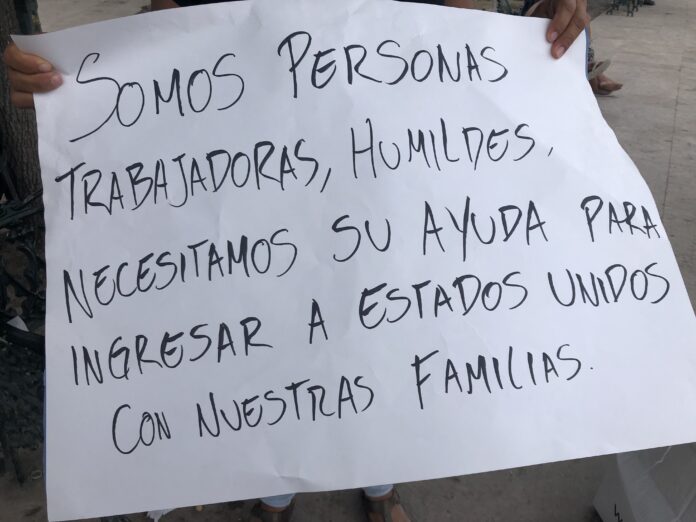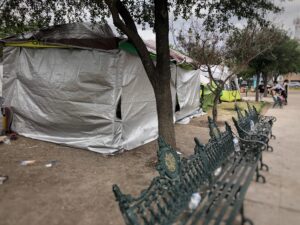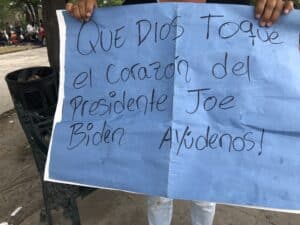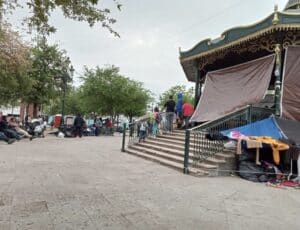
Dozens of migrants expelled from the U.S. to Reynosa walked onto the international bridge with a message for President Joe Biden, the first such protest in the Rio Grande Valley under the current administration.

“We are hard-working, humble people. We need your help to enter the United States with our families,” one poster read in Spanish. “May God touch the heart of President Joe Biden. Help us,” read another sign.
About 100 migrants, including women and children, walked onto the pedestrian walkway from the Reynosa entrance leading to the Hidalgo-Reynosa International Bridge, prompting a brief closure.
“Late Monday afternoon, shortly after 4 p.m., April 19, 2021, traffic at Hidalgo International Bridge was temporarily halted due to a protest on the Mexico side of the bridge. Traffic resumed without incident about 20 minutes later,” read a statement from U.S. Customs and Border Protection.
Migrants who participated shared videos of the protest with The Monitor.
“Queremos pasar,” or “we want to cross,” the group chanted as they packed onto the pedestrian walkway on the Mexican side of the bridge.
Helicopters flew overhead, CBP mobilized on the U.S. side of the bridge and the Mexican National Guard and Army patrolled nearby. Though, there’s no indication of any violent interaction.

Many who participated or watched said the momentum that inspired the manifestation built from frustration. Migrants seeking asylum continue to be sent back to Mexico under a Trump era policy which expels migrants during a global health crisis.
Similar protests at the international bridge were seen under President Trump, one as recent as June of last year.
Monday’s manifestation marks the first time the hundreds sent back to Reynosa have organized.
One of the women who organized the protest said the manifestation did not take days in planning but was created shortly before it happened.
She and her child came from Honduras two months ago, but have been stranded in Reynosa after they were not allowed to claim asylum in the U.S.
Another woman — Brenda, 47, from Honduras, who joined the protest — entered the U.S. with her daughter and granddaughter on Friday. She shared only her first name to protect her identity while they’re in Mexico.

Brenda was separated and processed separately from her pregnant 25-year-old daughter and 1-year-old granddaughter by CBP. All were expelled to Mexico, but only Brenda was sent back to Reynosa on Saturday.
On Sunday, Brenda heard from her daughter. Unlike many migrants with children under 6 years of age seeking asylum who are released into the U.S., Brenda’s daughter and granddaughter were taken and expelled back to Ciudad Juarez, almost 800 miles away.
“I fear for my daughter’s safety,” Brenda said.
Brenda was working as a teacher for many years in Honduras, but she decided to leave home and forfeit her government pension when she found out her pregnant daughter was abused and kicked by her husband. She carried an official copy of the police report as part of the proof they’re prepared to use in their asylum case, if they’re given the chance.
“How am I going to go back to Honduras?” Brenda said, noting that she had nowhere to return.
Like many migrants expelled to Reynosa, she found shelter at the plaza a block away from the bridge. The plaza is slowly transforming into an encampment, much like the one created in Matamoros under Trump’s Remain in Mexico, or Migrant Protection Protocols, policy.
On Monday, tarps were hung from string tied to trees at the plaza and others set up donated tents.
Stories of extortion and kidnappings at the border fill Brenda with anxiety and fear.
Another migrant who was seeking entrance into the U.S. said he encountered extortion at the bridge. Mario, a Guatemalan migrant whose real name is being withheld for fear of retaliation, said he and a small group were held by bridge employees on the Mexican side. They wanted $500 from each migrant, he claimed.
Mario said if they paid, they’d release them to coyotes who could take them across the river. However, the commotion from the protest prompted their release.
“They say that there’s a lot of crime in my country,” Mario said. “Here it’s worse.”



